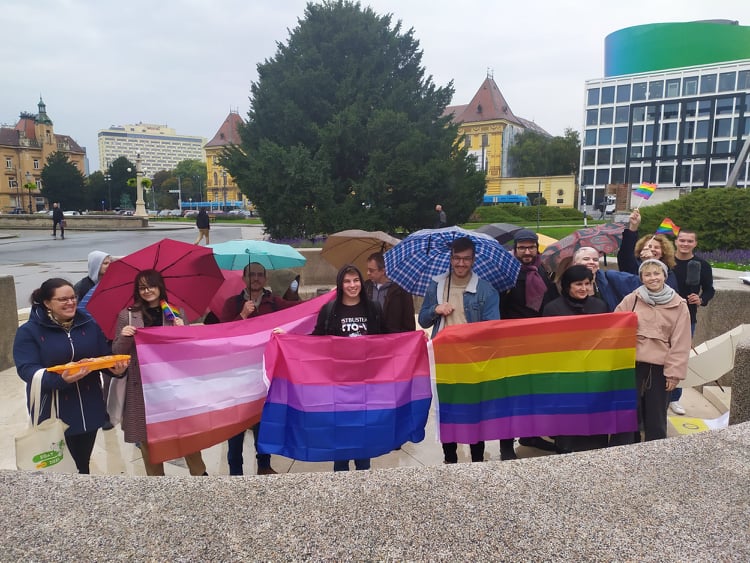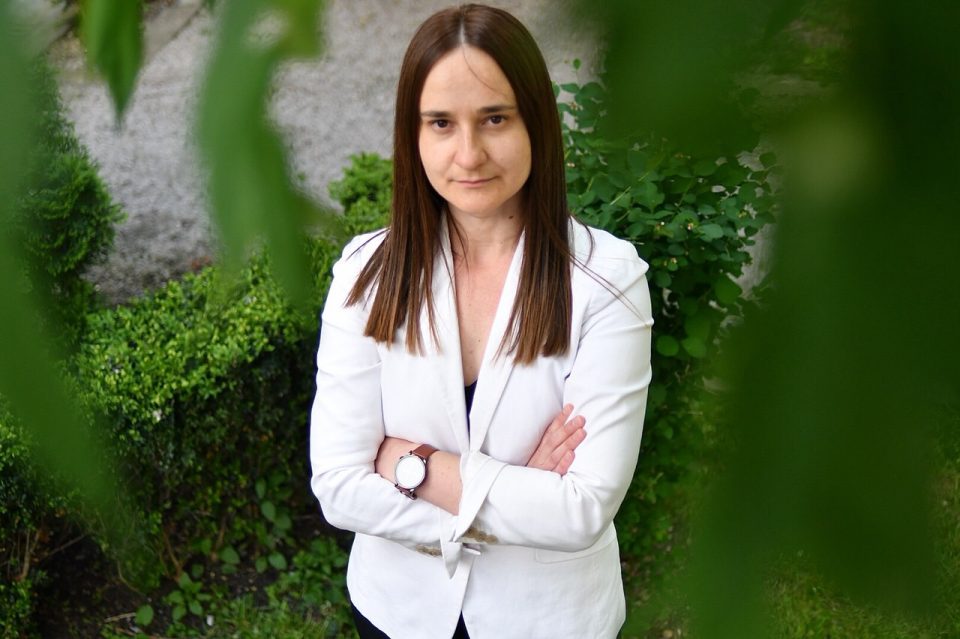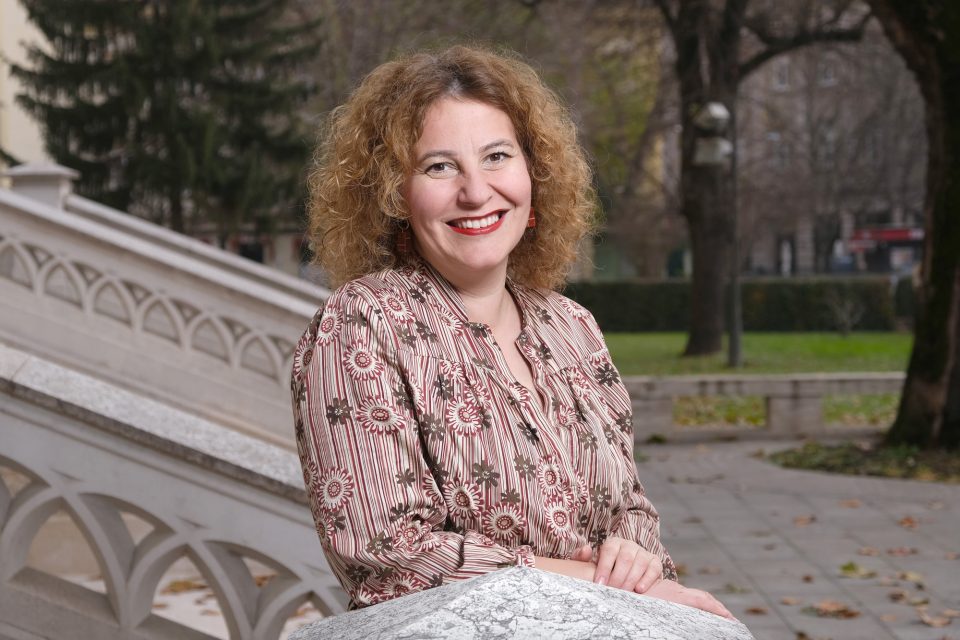
A regional example of positive practices is the Croatian LGBTIQ + association ZA-Pravo, which was founded two years ago at the University of Zagreb Law Faculty. This association fights against discrimination and works to promote the visibility of queer people in the university environment.
There are no organizations in Bosnia and Herzegovina for students to fight against the violence and discrimination facing the LGBT + community. While the initiative “I Didn’t Ask for It” [Nisam Tražila] has opened the door for tackling this issue, it has yet to be formalized as an organization. A regional example of positive practices is the Croatian LGBTIQ + association ZA-Pravo, which was founded two years ago at the University of Zagreb Law Faculty. This association fights against discrimination and works to promote the visibility of queer people in the university environment.
For students in ZA-Pravo, conservatism within the faculty is the main reason for their activism. In fact, their exclusion from the academic community could be said to have motivated the founding of the association.
“As expected, people opposed the idea. We have faced various obstacles regarding the registration and starting of the association, but we can proudly say that we haven’t given up. When there are loud voices from one side and when those voices actively lead to the endangerment of someone’s rights, acts of intolerance, or inappropriate comments – it is important to oppose them,” says ZA-Pravo.
Emina Bošnjak, executive director of the Sarajevo Open Center (SOC), pointed out that there is no student LGBT+ organization in any of the faculties across BiH. However, according to the information she has, attempts to form such an organization have been made at the public university in Tuzla.

“If I had to predict where it might happen first, I would guess that it would be in one of the philosophy faculties. Maybe in Tuzla, probably in Sarajevo,” Bošnjak added.
When it comes to the situation at certain faculties in BiH and the position of LGBT + students, Bošnjak highlights information she has received from people who contact the SOC, come to the events that they organize, or participate in their work.
“I don’t think I would be making a big mistake to say that those faculties where misogyny reigns and where cases of sexual harassment and violence against female students have been reported are far from receptive to issues of diversity in the context of sexual orientation and gender identity. These are still not places that will encourage LGBT + people to come out during their studies, nor will they provide effective protection in cases of violence and discrimination and clearly condemn homo / bi / transphobia,” said Bošnjak.
The concept of Gay / Straight Alliance
ZA-Pravo was founded on the International Day of Tolerance on November 16th, 2020, with the encouragement of Antonija Petričušić, a professor at the Department of Sociology at the Zagreb Faculty of Law. The Association was established in line with the concept of gay-straight alliances at American colleges. As Professor Petričušić said, she had the idea for such an association for years, and during of the pandemic, she decided to take action.

“What thrilled me was that gay and straight students came forward praising the idea and saying that this should have existed a long time ago. They didn’t know who was behind the idea, which means that they really believed in the idea. After just one month, we organized the founding assembly,” Petričušić recalls.
Today, the association has about 100 members, most of which are students. Professor Petričušić was the chair of the Board of Directors for the first year, after which she retired and left the leadership to the students. All decisions and activities are a matter of consensus.
Throughout history, student activism has brought about great social changes. Today, according to ZA-Pravo, LGBT + activism is very important due to the massive rise in recent years of the far-right, which aims to destroy LGBT + rights through spreading disinformation and moral panic. They are optimistic about future generations, because they believe that young people are increasingly inclined towards activism.
Although they are a relatively young association, they have already accomplished important things. They are unique in that they deal with LGBT + activism within the institution and there is no similar association at the Faculty of Law.
“So far, we have organized a scientific conference entitled ‘Development and Challenges of Protecting LGBTIQA + Rights,’ which we held on Human Rights Day. Then there was the public debate ‘Are we tolerant?’ which was attended by Alan Bowman, the Canadian ambassador to Croatia, Boris Milošević, the Vice President for Human Rights and Social Affairs, and Vice Dean of the Faculty of Law, Mario Krešić. However, our greatest pride is the peer-to-peer support group for LGBT + students called ‘Qrug,’” the association notes.
When it comes to university and regional cooperation, the team from ZA-Pravo was at the Law Faculty in Rijeka in May, where they gave a lecture. So far, they have collaborated with the University of Cork and the University of Rotterdam as partners in the European University of Post-Industrial Cities (UNIC) institutional design project to organize the Rainbow Walkway to symbolically celebrate International Coming Out Day in front of the Law School building.
The existence of an association such as ZA-Pravo at the faculty is important because in formal education, the curriculum does not provide space for professors and students to deal with topics such as activism, citizen participation, and engagement in associations. On the other hand, it is important to show students that they are supported even when the courses they are being taught do not open such topics.
“At the faculties, we can support students by reacting to the first instances of discrimination and condemning such acts. Talking about social issues and problems in a specific way so as not to insult anyone gives the LGBT + student population a sense of belonging. It’s much easier for me to open such topics because of the subject I teach, but you can also encourage students with, for example, a pin or a bag in rainbow colors, etc,” said Professor Petričušić.
Coming Out Usually Happens in College
The SOC has information which was made available through the analysis of research on the position of LGBT + people in education, the labor market, and housing in BiH, and ways in which opportunities shape the socio-economic position of LGBT + people.
Bošnjak explains that according to this research from 2020, people usually come out during their time at university, which is especially true for LGBT + individuals who come from smaller communities. According to Bošnjak, around 49% of LGBT + people come out during their education to only a small circle of people, while just a quarter of them speak openly about it.
“It’s clear that direct short-term measures at universities should be aimed at creating a safe space for LGBT + students, which will depend not only on the individual courage and solidarity of LGBT + people but also on openness, work, and communication of the administration, professors, and supporters,” said Bošnjak.
As is the case in other countries in the region, in Bosnia and Herzegovina, the activities of the “I Didn’t Ask for It” initiative brought to light numerous cases of sexual violence and harassment that occur in academic institutions. According to Bošnjak, the processes at the faculties that followed the repercussions of “I Didn’t Ask for It” opened the door for the faculties to deal with violence and discrimination against LGBT + people, first by acknowledging the existence of such violence and discrimination, and then by prevention.
The Sarajevo Open Center has participated in some of the processes of working on mechanisms to prevent sexual harassment, but also other forms of discrimination against LGBT + people in cooperation with the Sarajevo Academy of Performing Arts.
“Even if we manage to work on this with a large number of faculties, there will still be a sea of other problems that LGBT + people face while studying. Organizing associations of LGBT + students and faculty supporters would then be the right answer. Only these associations could create relevant and adequate measures in a timely manner for the administration, professors, and other students,” said Bošnjak.
Normalizing Diversity
In its less than two years of existence, ZA-Pravo has gained the attention not only of LGBT + people but also of the general public. People have heard that law students and professors have come together to change a discriminatory culture and promote tolerance. They have managed to create a safe place where LGBT+ students are accepted.
“I think that the existence of the association changes the climate in the Law Faculty and normalizes diversity, and it has been recognized by the administration because they invited us to coordinate certain projects. We cannot be ignored. Students are told about the existence of the association Za-Pravo on the orientation day. Erasmus students were made aware of it as well,” said Professor Petričušić. At the end of the conversation, he emphasized that if they manage to empower just one LGBT+ person through the existence and work of ZA-Pravo, their mission is a success.






